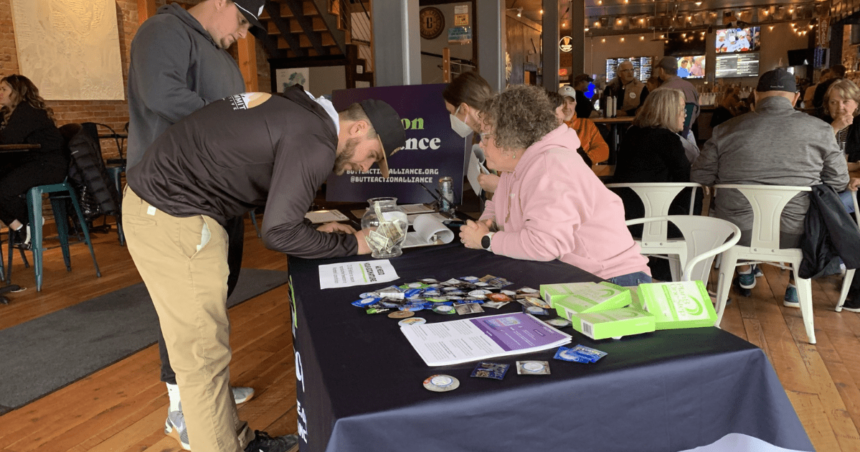Gwendolyn Chilcote made sure to grab the attention of patrons entering a bar in uptown Butte. Wearing a bright pink sweatshirt and flashing a big smile, she didn’t shy away from making eye contact. She had a single question for everyone passing by her table on that Tuesday in mid-May.
“Have you signed the petition for reproductive rights yet?”
Two men in their early thirties, with beards, hoodies, and baseball hats, were among the bar-goers who hadn’t yet signed the petition supporting Constitutional Initiative-128. They turned back to learn more.
Chilcote, a volunteer with the Butte Action Alliance, explained that signing the petition would help get CI-128 on the ballot. This initiative would give voters in November the opportunity to decide whether to protect pregnancy decisions in Montana between a woman and her doctor.
Both men, registered voters, nodded and signed. Chilcote watched closely, ensuring each detail was correct to make the signature count. With two down, there were still thousands more to collect.
The signature-gathering campaign for CI-128 had been ongoing for about eight weeks by the last week of May. The sponsoring group, Montanans Securing Reproductive Rights (MSRR), needed to submit verified signatures to meet the deadline. Supporters and opponents acknowledged the challenges in getting the initiative on the ballot due to delays caused by legal battles.
MSRR’s strategy for gathering signatures was cautious, avoiding large public events to protect volunteers from harassment and violence. Instead, volunteers and paid staff from the firm Landslide Political went out to gather signatures.
Opponents, organized under the Montana Life Defense Fund, were actively working to counter CI-128, using tactics like videotaping volunteers in public places. The tension surrounding the initiative highlighted the evolving landscape of abortion rights in Montana.
For voters, CI-128 presented a historic opportunity to weigh in on legal abortion. Chilcote encountered a mix of excitement and confusion among people she approached, some unaware of the initiative’s significance.
Organized Opposition
In a Butte bar before Chilcote’s signature-gathering, the Montana Life Defense Fund trained volunteers to oppose CI-128. The group aimed to spread messages questioning the initiative’s efficacy and recruit volunteers to hinder its progress. Tactics included videotaping signature gatherers to disrupt the process.
Despite opposition tactics, CI-128 supporters remained focused on collecting signatures. Complaints were filed against the MSRR campaign, but they were deemed baseless. The volunteers faced challenges, but they were committed to their cause.
A Cautious Approach
In Missoula, MSRR volunteers like Lillian Thomas faced challenges in gaining new supporters due to the weather. Positive interactions with signatories gave hope, but the campaign’s cautious approach limited large public events to protect volunteers from potential threats.
Various tactics were employed by both supporters and opponents of CI-128 across Montana. The tight-lipped approach from MSRR was a response to the tense political climate and concerns about safety.





